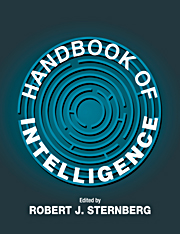Book contents
- Frontmatter
- Contents
- Preface
- Contributors
- PART I THE NATURE OF INTELLIGENCE AND ITS MEASUREMENT
- PART II DEVELOPMENT OF INTELLIGENCE
- PART III GROUP ANALYSES OF INTELLIGENCE
- PART IV BIOLOGY OF INTELLIGENCE
- PART V INTELLIGENCE AND INFORMATION PROCESSING
- PART VI KINDS OF INTELLIGENCE
- PART VII TESTING AND TEACHING INTELLIGENCE
- PART VIII INTELLIGENCE, SOCIETY, AND CULTURE
- 23 Intelligence and Education
- 24 Intelligence and Public Policy
- 25 Intelligence and Culture
- PART IX INTELLIGENCE IN RELATION TO ALLIED CONSTRUCTS
- Author Index
- Subject Index
23 - Intelligence and Education
Published online by Cambridge University Press: 05 June 2012
- Frontmatter
- Contents
- Preface
- Contributors
- PART I THE NATURE OF INTELLIGENCE AND ITS MEASUREMENT
- PART II DEVELOPMENT OF INTELLIGENCE
- PART III GROUP ANALYSES OF INTELLIGENCE
- PART IV BIOLOGY OF INTELLIGENCE
- PART V INTELLIGENCE AND INFORMATION PROCESSING
- PART VI KINDS OF INTELLIGENCE
- PART VII TESTING AND TEACHING INTELLIGENCE
- PART VIII INTELLIGENCE, SOCIETY, AND CULTURE
- 23 Intelligence and Education
- 24 Intelligence and Public Policy
- 25 Intelligence and Culture
- PART IX INTELLIGENCE IN RELATION TO ALLIED CONSTRUCTS
- Author Index
- Subject Index
Summary
INTELLIGENCE AND EDUCATION
The fields of intelligence and education are so intimately bound together that it would be impossible to understand intelligence without knowing about its relation to education. Quite literally, intelligence is the child of education, because the field of intelligence testing was born from the need to develop a test that would predict children's school success (Wolf, 1973). The thesis of this chapter is that the field of education has been instrumental in challenging psychologists to develop more authentic theories of individual differences in intellectual ability and that the emerging cognitive theories of intelligence can be instrumental in reforming educational practice. In short, the study of intelligence and education provides an example of the fruitful interaction between the practical demands of educators and the basic research focus of cognitive scientists. The first section of this chapter reviews education's contributions to the study of intelligence, and the second section reviews the study of intelligence's contributions to education.
EDUCATION'S CONTRIBUTIONS TO THE STUDY OF INTELLIGENCE
The historical connection between intelligence and education is no accident. As mandatory public education became commonplace by the late 1800s, educators were confronted with an overwhelming observation: Students of the same chronological age displayed a range of individual differences in intellectual ability. Like other advances in psychological theory, the study of intelligence has been motivated by the practical problems of education (Mayer, 1992). In this case, the practical pedagogic problem of how to address the needs of individual students touched off a worldwide search for an “instrument to differentiate children and adolescents on the basis on their ability to learn” (Wolf, 1973, p. 139).
- Type
- Chapter
- Information
- Handbook of Intelligence , pp. 519 - 533Publisher: Cambridge University PressPrint publication year: 2000
- 17
- Cited by

